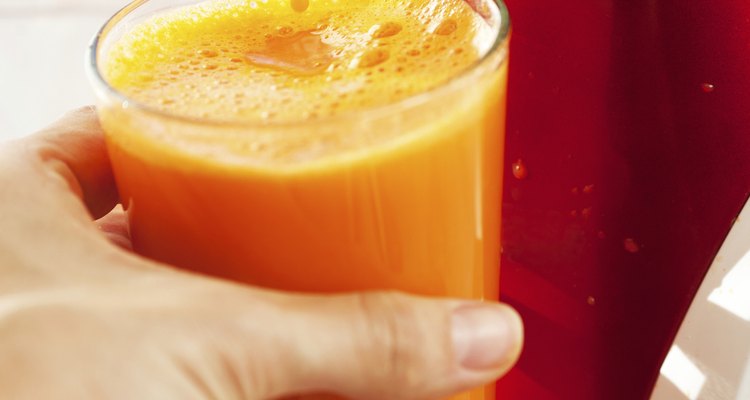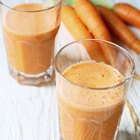
boumenjapet/iStock/Getty Images
The carrot juice diet is a detoxification diet. Though detox diets are popular, they are not based on scientific evidence. With the help of the kidneys and the liver, the body already effectively and efficiently removes and excretes toxins in urine and stools. Possible side effects of detox diets include fatigue and dizziness. Though some people report feeling energetic during and after a detox diet, this may be the result of believing they are doing something that’s beneficial for their health.
Parameters
The carrot juice diet involves drinking 8 oz. of organic carrot juice every two to three hours throughout the day. Because freshly squeezed juice can develop harmful bacteria quickly, it is best to make the juice right before you drink it. As a liquid diet, no solid food is involved in the carrot juice diet. Some describe the carrot juice diet as a one-day event, while others claim it could last up to a week.
Purpose
Proponents of the carrot juice diet tout its benefits as a means for detox, to eliminate food and possible toxins from the digestive system. The theory is that while consuming only organic carrot juice, the body has a chance to cleanse itself from harmful debris that it has been storing inside in order to encourage healing. There is some mention of the diet for reducing the risk of cancer, boosting the immune system and aiding in digestion. The carrot juice diet is not intended for weight-loss.
Nutrition
Carrot juice contains vitamin A, C and K, the B complex vitamins, calcium, magnesium, potassium, phosphorous, sulfur and iron. But eating whole carrots is better than juicing them because then you also get the fiber. Digesting the whole vegetable increases your metabolism and provides bulk, which helps you feel full longer. Carrot juice provides practically no fat or protein.
A Better Way
Rich in vitamins, minerals and cancer-fighting phytochemicals, carrot juice can be a part of a healthy well-balanced diet. The best diet includes fruits and vegetables, whole grains and lean protein, according the Mayo Clinic. Typically, you should aim for a combined total of five servings of fruit and vegetables per day. Juicing may be a helpful way to ensure you meet that goal, especially if you don’t enjoy eating vegetables, but it should not be your only source.
Related Articles

What Juices Are Good for Healing Acne ...

Where to Buy Pomegranate Juice

How to Keep Cucumber Juice Fresh

Best Fruit Juices to Cleanse the Colon

How Long Will Pineapple Juice Stay Good ...

Vegetable Juicing & Enzymes

Pomegranate Juice & Acne

Apple Juice Cleansing Diet

What Juices Are Good for Healing Acne ...

How to Use Wheatgrass for Washing Hair

How to Juice for Colon Health
How to Tell If Fresh Tomato Juice Is ...

Can Beet Juice Sit Out Overnight?

The Use of Neem Juice in Skin Care as ...

Can You Juice Celery Leaves?

Noni Juice Benefits for Skin

Nutrition Information on Blueberries

How Much Pomegranate Juice Should One ...

How Long Can You Preserve Fresh ...

What Are the Benefits of Grapefruit for ...
References
Writer Bio
Ann Wolters has been a writer, consultant and writing coach since 2008. Her work has appeared in "The Saint Paul Almanac" and in magazines such as "Inventing Tomorrow" and "Frontiers." She earned a Master of Arts in English as a second language from the University of Minnesota.
Photo Credits
boumenjapet/iStock/Getty Images